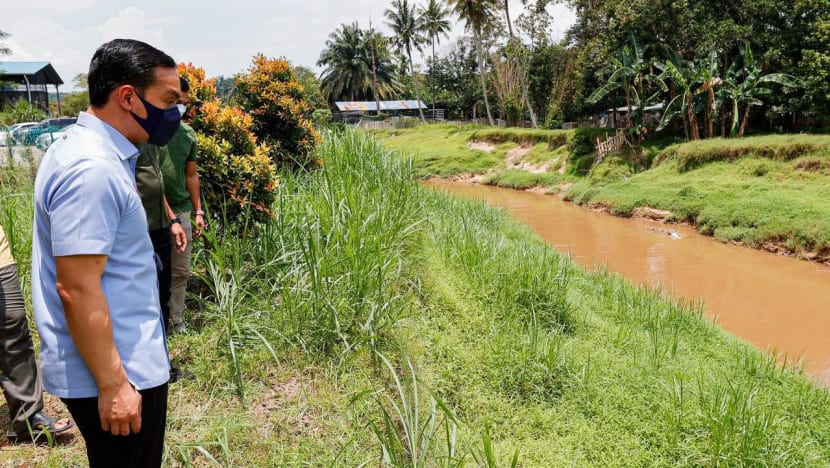Johor foul odour: Chief minister vows ‘strict action’ against those behind toxic chemicals in river areas
Mr Onn Hafiz Ghazi said that an investigation by various state departments had revealed toxic components polluting the water and air, and that he had instigated a special committee to tackle the issue.

Johor Chief Minister Onn Hafiz Ghazi inspects a local river. (Photo: Facebook/Onn Hafiz Ghazi)

This audio is generated by an AI tool.
SINGAPORE: Johor’s chief minister has vowed to take “strict action” against those contributing to toxic chemical pollution, after ordering the police to form a special task force to tackle the issue.
Mr Onn Hafiz Ghazi was responding to complaints over a foul odour plaguing several areas in the Malaysian state.
The Johor government has also ordered the closure of three schools in Kempas on Tuesday (Sep 10) due to the risk of exposure to fumes.
State Education and Information Committee chairman Aznan Tamin, quoted in the Malay Mail, said that the temporary closure is a precautionary measure to minimise the children’s exposure to any potential chemical odour.
Mr Onn Hafiz said that he had visited the affected locations and that an investigation by several state departments revealed that chemicals in the river posed a risk to public health.
“I have made a visit to the relevant locations to see for myself the real situation and assess the level of pollution occurring,” said Mr Onn Hafiz in a Facebook post on the evening of Sep 9.
He added that Johor’s Department of Environment as well as the Department of Fire and Rescue have carried out checks to identify the chemicals contained in contaminated water samples.
“The investigation found that the chemicals found in the river area were potentially endangering public health, with toxic components that had polluted the air and caused a very strong and unpleasant odour.”
Mr Onn Hafiz said that he had instructed the Royal Malaysia Police and related agencies to set up a special committee to tackle the pollution issue so “strict action can be taken against irresponsible parties”.
In the early hours of Sep 3, villagers reported a disturbing smell had spread across residential areas in Taman Daya, Taman Mount Austin, Taman Istimewa and Kampung Melayu Pandan.
The stench was so strong it caused several residents to feel dizzy. Some reported headaches due to the sharp gas-like odour. A local kindergarten was closed as a precaution.
Chairman of the Kampung Melayu Pandan residents’ association, 51-year-old Mr Fauzi Mohamad, reported that the colour of the local river was “something I have never seen in my life, black, murky and oily”.
District Fire and Rescue Department senior officer Khairul Azhar Abd Aziz said it received numerous calls from residents of Taman Mount Austin, and Taman Istimewa.
A team of 19 men from the Hazardous Material unit was deployed to the scene.
Quoted in local media, state environment and health committee chairman Ling Tian Soon said that initial soil and water samples taken from Sungai Pandan in Kampung Melayu Pandan, which he said was the suspected source of the pollution, showed the presence of chemical substances.
However at that point, the type was yet to be identified.
Local media reported that the Johor Department of Environment detected ammonia gas levels exceeding normal thresholds in the area.
On Sep 4, unidentified packages were discovered dumped along the banks of the Sungai Pandan tributary near Taman Daya.
However, local media reported that the stench was noticeably less and that residents in affected areas had begun to go about their daily activities.
Two days later, the Environment Department and the state Fire and Rescue Department discovered suspicious chemicals dumped along the banks of the Sungai Plentong tributary in the Desa Tropika Industrial Area of Johor.
Mr Ling said that the chemicals were found at around 3.15pm following complaints about a strong chemical odour.
He noted that there was an oil spill on the river's surface, and samples were taken while part of the spill was cleared using absorbent pads.
Mr Ling also emphasised that the state government and authorities strongly condemned such illegal chemical waste disposals, and urged the public to immediately contact the Environment Department if they have any information on the pollution.
On Sep 9, several locations in the Malaysian state reported a strong chemical odour.
Tebrau member of parliament (MP) Jimmy Puah said he had received complaints that the stench had hit local villages, Kampung Tawakal and Kampung Maju Jaya, in Skudai.
Mr Jimmy, who is a member of the People's Justice Party (PKR) that is part of the ruling Pakatan Harapan (PH) coalition said in a Facebook post that the odour caused some of the villagers to vomit.
“Most likely the stench is believed to be coming from a nearby river,” he said, adding that he had contacted the Kempas fire station chief to take immediate action and send emergency aid to the residents if necessary.
Skudai assemblyman Marina Ibrahim said some residents complained of headaches, sore throats and vomiting due to the strong smell.
She urged the public not to worry about the situation and added that she and her team were at the location to monitor public complaints over the strong chemical odour.
In 2019, Singapore’s then-prime minister Lee Hsien Loong raised concerns over pollution and the long-term yield of the Johor river.
This was following the temporary closure of the waterworks of PUB — Singapore’s national water agency — in Kota Tinggi, Johor, which had to be shut because of high ammonia levels.
The pollution was traced to a burst reservoir at a biocomposite centre next to an oil-palm mill in Sedenak, Johor.
A month earlier, authorities had discovered the illegal dumping of toxic waste at Sungai Kim Kim in Pasir Gudang, Johor.
The dumping resulted in toxic fumes affecting thousands of residents and forcing around 100 schools in the area to close.














